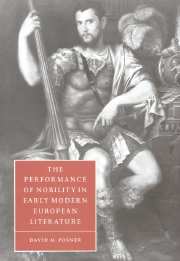Book contents
- Frontmatter
- Contents
- Acknowledgments
- 1 Introduction: “The Noble Hart”
- 2 Montaigne and the staging of the self
- 3 Mask and error in Francis Bacon
- 4 Noble Romans: Corneille and the theatre of aristocratic revolt
- 5 La Bruyère and the end of the theatre of nobility
- Notes
- Bibliography
- Index
- Cambridge Studies in Renaissance Literature and Culture
4 - Noble Romans: Corneille and the theatre of aristocratic revolt
Published online by Cambridge University Press: 22 September 2009
- Frontmatter
- Contents
- Acknowledgments
- 1 Introduction: “The Noble Hart”
- 2 Montaigne and the staging of the self
- 3 Mask and error in Francis Bacon
- 4 Noble Romans: Corneille and the theatre of aristocratic revolt
- 5 La Bruyère and the end of the theatre of nobility
- Notes
- Bibliography
- Index
- Cambridge Studies in Renaissance Literature and Culture
Summary
By the time of the appearance of the final version of Bacon's Essayes, in 1625, their author had been in involuntary retirement from the theatre of the Jacobean court for some time, and would quit a larger stage for good only a year later. The Essayes may indeed seem to represent both the apogee and the endpoint of a certain trajectory within the larger problem of noble identity in the literature of the late Renaissance; however, their appearance by no means signals an end to literary explorations of what we have called the “theatre of nobility.” On the contrary, the crisis of noble identity is one of the dominant themes of Continental writing after 1600. We see this crisis reflected both in the popularity of the Essayes themselves (to say nothing of the many reeditions of Montaigne, Castiglione, Guazzo, and others), and in the proliferation of imitations of these works in the first half of the century in both England and France. We have already seen how these works, whether offering helpful advice on how to get ahead, or fulminating against the amorality and hypocrisy of the court and its denizens, are dominated by the master trope of theatre. We have also seen how these works, in Italy and England but also in France, constitute a kind of substrate for more complex literary versions of the discourse of nobility.
- Type
- Chapter
- Information
- The Performance of Nobility in Early Modern European Literature , pp. 122 - 180Publisher: Cambridge University PressPrint publication year: 1999



